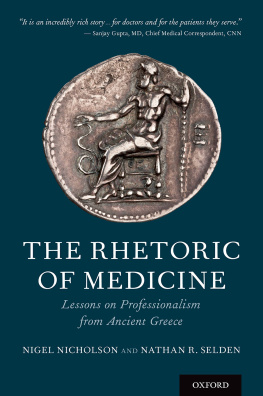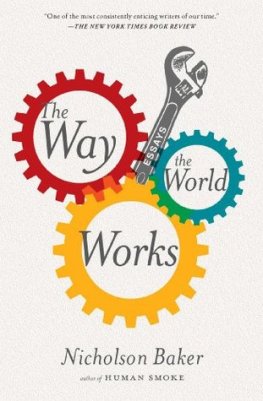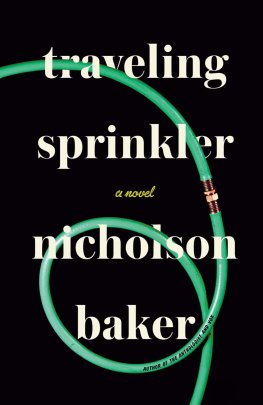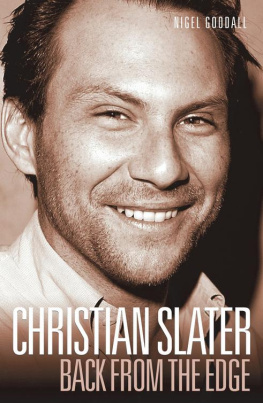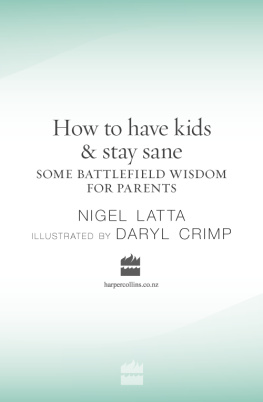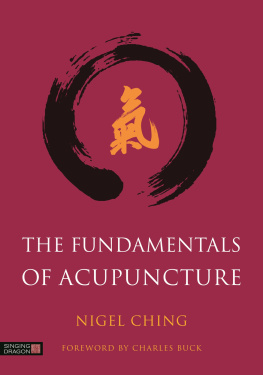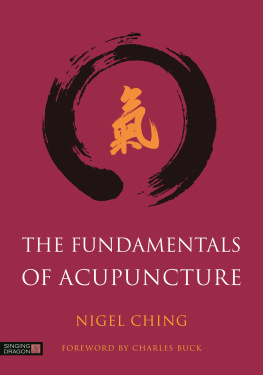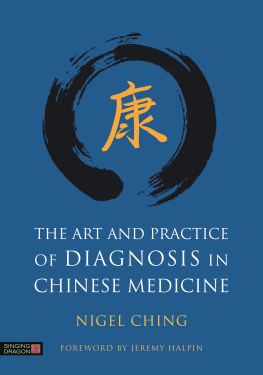Dr Nigel Nicholson - The Rhetoric of Medicine
Here you can read online Dr Nigel Nicholson - The Rhetoric of Medicine full text of the book (entire story) in english for free. Download pdf and epub, get meaning, cover and reviews about this ebook. year: 2019, publisher: OUP Premium, genre: Romance novel. Description of the work, (preface) as well as reviews are available. Best literature library LitArk.com created for fans of good reading and offers a wide selection of genres:
Romance novel
Science fiction
Adventure
Detective
Science
History
Home and family
Prose
Art
Politics
Computer
Non-fiction
Religion
Business
Children
Humor
Choose a favorite category and find really read worthwhile books. Enjoy immersion in the world of imagination, feel the emotions of the characters or learn something new for yourself, make an fascinating discovery.
- Book:The Rhetoric of Medicine
- Author:
- Publisher:OUP Premium
- Genre:
- Year:2019
- Rating:3 / 5
- Favourites:Add to favourites
- Your mark:
- 60
- 1
- 2
- 3
- 4
- 5
The Rhetoric of Medicine: summary, description and annotation
We offer to read an annotation, description, summary or preface (depends on what the author of the book "The Rhetoric of Medicine" wrote himself). If you haven't found the necessary information about the book — write in the comments, we will try to find it.
The Rhetoric of Medicine — read online for free the complete book (whole text) full work
Below is the text of the book, divided by pages. System saving the place of the last page read, allows you to conveniently read the book "The Rhetoric of Medicine" online for free, without having to search again every time where you left off. Put a bookmark, and you can go to the page where you finished reading at any time.
Font size:
Interval:
Bookmark:

Modern medical techniques are used to laser focus radiation on a deep brain tumor, sniff out cancer cells circulating in the blood, and induce stem cells to return to their native or pluripotent state. Surely, the ancient Greek medical practitioners would see all of this as science fiction, yet there are many connections between the medicine we see today and the origins of the profession. In both, the center of the relationship between physicians and patients should be the physicians core commitment to putting their patients interests above their own. If we spend the time to dig deeply into the rhetoric of medicine over time, as the authors Nicholson and Selden have done, we find the motivations of early doctors, their foibles and how they perceived themselves. It is an incredibly rich story with lessons around money, competition and autonomy for doctors and for the patients they serve.
Sanjay Gupta, MD, Staff Neurosurgeon, The Emory Clinic, Atlanta, GA, Chief Medical Correspondent, CNN
Nicholson and Selden offer a pioneering rejoinder to the persistent estrangement of classics and modern medicine. Acutely sensitive to cultural difference, the authors leverage the temporal and technological gulf between ancient Greek and modern American medicine to construct a nuanced and productive juxtaposition: by exposing the fault lines in the self-representation of ancient Greek doctors across an array of key issues, they generate new ways for the American physician to perceive and confront modern counterparts to these very tensions. This is a rare hybrid of a book that couples accessible but consummate expertise of the ancient material with concrete insights for practicing doctors.
Margaret Foster, PhD, Associate Professor, Department of Classical Studies, Indiana University, Bloomington, IN
In this remarkable and wise book, a noted scholar of Ancient Greece and a leading medical educator illuminate several themes that bind together the stories we have told one another across two thousand years of history; the rhetoric that shapes conflicting views of major economic, social, and ethical issues common to the experience of physicians and patients in the age of Hippocrates; and those that still bedevil us in the contemporary era of modern medicine and technology. Practicing physicians, hospital administrators, and those who teach humanistic courses in Narrative Medicine and History of Science are among the many who will find The Rhetoric of Medicine a critical text for promoting the wellness of todays doctors and their patients.
Michael Salcman, MD, Former Chair of Neurosurgery, University of Maryland, editor of Poetry in Medicine, and special lecturer in the Osher Institute at Towson University, Towson, MD
This unique and timely collaboration between a classicist and a physician re-connects cultural and rhetorical threads between ancient and modern medicine that were severed well over a century ago. There were good scientific reasons for medicine to modernize itself at the time, of course, but as this study shows, much was also lost in this wholesale break from its ancient tradition. By examining the rhetoric of Greek doctors as they contemplated (e.g., their relationship with patients, their own embodiment or their responsibilities as professional caregivers), Nicholson and Selden make a compelling case that medicine of our own time would benefit from a similarly self-conscious approach to how doctors talk about themselves and their profession both to patients and a wider public. Within programs in medical humanities and bioethics in particular, this book will stand as a foundational landmark.
Ralph M. Rosen, PhD, Vartan Gregorian Professor of the Humanities, Professor of Classical Studies, University of Pennsylvania, Philadelphia, PA

Oxford University Press is a department of the University of Oxford. It furthers the Universitys objective of excellence in research, scholarship, and education by publishing worldwide. Oxford is a registered trade mark of Oxford University Press in the UK and certain other countries.
Published in the United States of America by Oxford University Press
198 Madison Avenue, New York, NY 10016, United States of America.
Oxford University Press 2019
All rights reserved. No part of this publication may be reproduced, stored in a retrieval system, or transmitted, in any form or by any means, without the prior permission in writing of Oxford University Press, or as expressly permitted by law, by license, or under terms agreed with the appropriate reproduction rights organization. Inquiries concerning reproduction outside the scope of the above should be sent to the Rights Department, Oxford University Press, at the address above.
You must not circulate this work in any other form and you must impose this same condition on any acquirer.
CIP data is on file at the Library of Congress
ISBN 9780190457488
eISBN 9780190457501
This material is not intended to be, and should not be considered, a substitute for medical or other professional advice. Treatment for the conditions described in this material is highly dependent on the individual circumstances. And, while this material is designed to offer accurate information with respect to the subject matter covered and to be current as of the time it was written, research and knowledge about medical and health issues is constantly evolving and dose schedules for medications are being revised continually, with new side effects recognized and accounted for regularly. Readers must therefore always check the product information and clinical procedures with the most up-to-date published product information and data sheets provided by the manufacturers and the most recent codes of conduct and safety regulation. The publisher and the authors make no representations or warranties to readers, express or implied, as to the accuracy or completeness of this material. Without limiting the foregoing, the publisher and the authors make no representations or warranties as to the accuracy or efficacy of the drug dosages mentioned in the material. The authors and the publisher do not accept, and expressly disclaim, any responsibility for any liability, loss or risk that may be claimed or incurred as a consequence of the use and/ or application of any of the contents of this material.
To Our Children
This book emerged from a casual conversation at dinner some ten years ago. Nate was amused to run across a brief reference to Asclepius, the supposed father of Western medicine and surgery, which included a quotation from one of the poets central to Nigels research on classical literature, the Greek poet Pindar. Nate shared the reference, and we talked more about the passage in question, which, rather than a celebration of Asclepius, turns out to be a complex and, finally, very negative portrait of him and, by implication, all physicians.
We were struck by what we could learn from each other. The experience of a practicing physician illuminated the complexities of Pindars portrait of Asclepius, while the complexities of Pindars portrait helped to give context to the experience of medicine as practiced today. We wondered if we could write a piece together that explored contemporary practice by exploring the ancient poem. That discussion led to an unfamiliar venture for the two of us, a joint article about Asclepius, Pindar, and money (Nicholson and Selden, Poets, Doctors, and the Rhetoric of Money,
Font size:
Interval:
Bookmark:
Similar books «The Rhetoric of Medicine»
Look at similar books to The Rhetoric of Medicine. We have selected literature similar in name and meaning in the hope of providing readers with more options to find new, interesting, not yet read works.
Discussion, reviews of the book The Rhetoric of Medicine and just readers' own opinions. Leave your comments, write what you think about the work, its meaning or the main characters. Specify what exactly you liked and what you didn't like, and why you think so.

